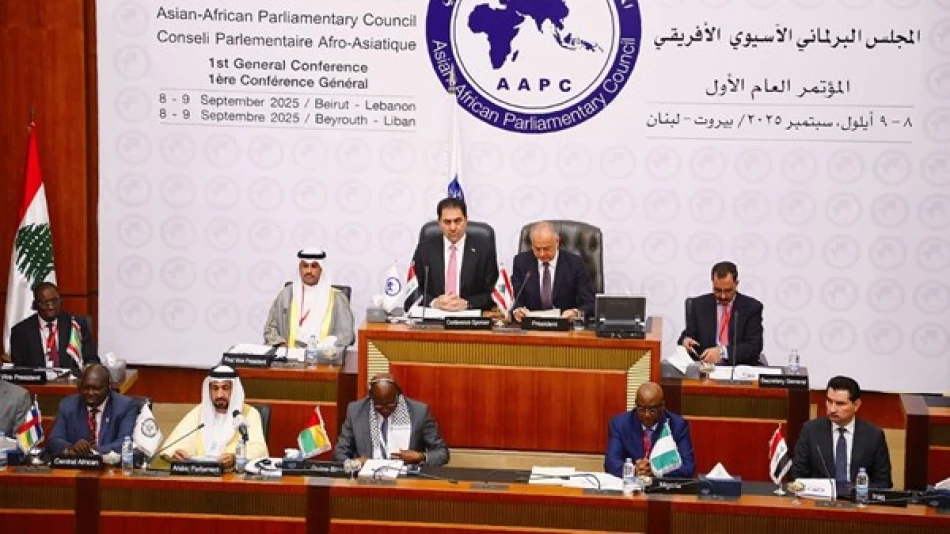
Arab Parliament: Arab States Serve as Bridge for Asia-Africa Integration and Cooperation
Arab Parliament Chief Positions Middle East as Key Bridge in Asia-Africa Strategic Alliance
As global geopolitical tensions intensify and economic blocs realign, Arab Parliament President Mohammed bin Ahmed Al-Yamahi has outlined a vision for Arab nations to serve as the critical link between Asia and Africa—two continents that together represent over two-thirds of the world's population and vast untapped economic potential. Speaking at the Asian-African Parliamentary Council meeting in Lebanon, Al-Yamahi emphasized that this geographic positioning could reshape global power dynamics in an increasingly multipolar world.
The Geographic Advantage: A Natural Continental Bridge
Al-Yamahi's assertion rests on a compelling geographic reality: Arab nations are uniquely positioned with roughly half their territories in Africa and half in Asia. This dual continental presence creates what he described as a "natural and strategic bridge" for enhanced integration between the two regions.
The timing of this message is significant. As Western-dominated international institutions face challenges and emerging economies seek alternative frameworks for cooperation, the Asia-Africa corridor represents one of the most promising avenues for South-South collaboration. Countries like China, India, and emerging African economies are already deepening trade ties, but the Arab world's geographic centrality could accelerate this trend.
Economic Powerhouse Potential
The numbers support Al-Yamahi's optimistic outlook. Asia and Africa combined account for more than two-thirds of global population, possess enormous natural resource reserves, feature rapidly growing markets, and boast young, dynamic workforces. This demographic and resource combination positions the regions to become a formidable economic bloc capable of influencing global power balances.
Market Implications
For investors and multinational corporations, this vision suggests several opportunities. Enhanced Asia-Africa integration through Arab intermediation could streamline supply chains, reduce transaction costs, and open new market access routes. The Arab world's existing financial infrastructure—from Dubai's trading hubs to Qatar's sovereign wealth funds—already facilitates much of this cross-continental commerce.
Parliamentary Diplomacy as a Tool
Al-Yamahi emphasized the Arab Parliament's commitment to multilateral parliamentary diplomacy, highlighting plans for increased dialogue and coordination between national parliaments across both continents. This approach mirrors successful regional integration models, such as the European Parliament's role in EU development or ASEAN's parliamentary assembly.
The focus on parliamentary cooperation rather than purely executive-level agreements suggests a more grassroots, democratic approach to regional integration. By involving legislators who maintain direct connections to their populations, this strategy could build more sustainable and domestically supported international partnerships.
Geopolitical Context and Timing
This initiative comes amid what Al-Yamahi described as an "unstable world with increasing geopolitical and economic polarization." The reference clearly alludes to US-China tensions, the Russia-Ukraine conflict's global economic impact, and growing calls for alternatives to Western-dominated international institutions.
Similar to how the UAE has positioned itself as a neutral hub between East and West, or how Singapore leverages its geographic position for economic advantage, Arab nations appear to be collectively pursuing a strategy of beneficial neutrality and bridge-building.
Challenges and Realistic Prospects
While Al-Yamahi's vision is ambitious, several factors could determine its success. Arab nations themselves face varying degrees of political stability, economic development, and international alignment. Countries like Saudi Arabia and the UAE have different strategic priorities than nations such as Lebanon or Yemen.
However, the growing trend toward economic diversification across the Gulf states, combined with Africa's rising economic profile and Asia's continued growth, creates favorable conditions for this type of trilateral cooperation. The key will be whether parliamentary diplomacy can translate into concrete trade agreements, infrastructure projects, and investment flows that benefit all parties involved.
Most Viewed News

 Layla Al Mansoori
Layla Al Mansoori






